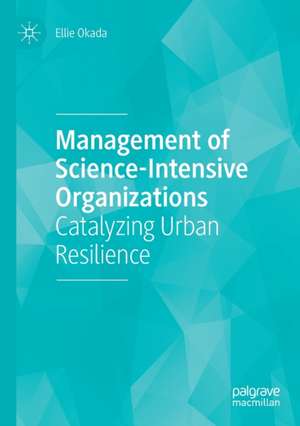Management of Science-Intensive Organizations: Catalyzing Urban Resilience
Autor Ellie Okadaen Limba Engleză Paperback – 6 ian 2022
| Toate formatele și edițiile | Preț | Express |
|---|---|---|
| Paperback (1) | 777.03 lei 6-8 săpt. | |
| Springer International Publishing – 6 ian 2022 | 777.03 lei 6-8 săpt. | |
| Hardback (1) | 781.31 lei 6-8 săpt. | |
| Springer International Publishing – 5 ian 2021 | 781.31 lei 6-8 săpt. |
Preț: 777.03 lei
Preț vechi: 947.59 lei
-18% Nou
Puncte Express: 1166
Preț estimativ în valută:
148.70€ • 154.68$ • 122.76£
148.70€ • 154.68$ • 122.76£
Carte tipărită la comandă
Livrare economică 14-28 aprilie
Preluare comenzi: 021 569.72.76
Specificații
ISBN-13: 9783030640446
ISBN-10: 3030640442
Ilustrații: XIII, 210 p. 1 illus.
Dimensiuni: 148 x 210 mm
Greutate: 0.3 kg
Ediția:1st ed. 2021
Editura: Springer International Publishing
Colecția Palgrave Macmillan
Locul publicării:Cham, Switzerland
ISBN-10: 3030640442
Ilustrații: XIII, 210 p. 1 illus.
Dimensiuni: 148 x 210 mm
Greutate: 0.3 kg
Ediția:1st ed. 2021
Editura: Springer International Publishing
Colecția Palgrave Macmillan
Locul publicării:Cham, Switzerland
Cuprins
PART I: THEORETICAL FRAMEWORK FOR SCIENCE-INTENSIVE ORGANIZATIONS.- Chapter 1: Introduction.- Chapter 2: Urban Resilience and Opportunity Identification of Social Enterprises.- Chapter 3: Emerging Technologies and Organizations for Urban Resilience.- PART II: ENTREPRENEURSHIP IN URBAN RESILIENCE.- Chapter 4: Addressing Environmental Inequity by New Sciences.- Chapter 5: Emergence and Dynamism of New Material Sciences.- Chapter 6: Artificial Intelligence to Broaden Beneficiaries.- PART III: REVOLUTION OF BENEFICIARIES.- Chapter 7: Scale-up of Social Enterprises.- Chapter 8: Strategy and Governance
Notă biografică
Ellie Okada long served as a professor of management who continues to specialize in management theory. Former visiting scholar at Harvard University’s Weatherhead Center for International Affairs and Columbia Business School, she worked for a research university in Japan, Yokohama National University, as a tenured full professor for over 24 years. She is Senior Academic Fellow, President, and Founder of the Boston Cancer Policy Institute, a research institute of management in new social science.
Textul de pe ultima copertă
“Okada’s book is a much welcome contribution to studies on the management of knowledge-intensive organizations. A unique focus on urban resilience allows her to recognize the key emerging trends in collaborative society and citizen science movements, and describe the key new technologies and strategies needed to address them”.
---- Dariusz Jemielniak, Head, MINDS (Management in Networked and Digital Societies) Department, Kozminski University, Poland, Faculty Associate, Berkman-Klein Center for Internet and Society, Harvard University, USA, and co-author of Collaborative Society (2020).
This book examines what mechanisms enable science-intensive organizations to broaden beneficiaries of science in urban settings. Focusing on organizations that constitute urban resilience systems and networks, it maps the contributions of academic institutions, established multinationals, and entrepreneur firms in environmental, material, and related life sciences. It then develops a model of strategy and governance for organizations to invest in and implement new environmental material science projects. This book provides researchers with a framework based on management theories of R&D and resource allocation for resolving urban issues.
Ellie Okada long served as a professor of management who continues to specialize in management theory. Former visiting scholar at Harvard University’s Weatherhead Center for International Affairs and Columbia Business School, she worked for a research university in Japan, Yokohama National University, as a tenured full professor for over 24 years. She is Senior Academic Fellow, President, and Founder of the Boston Cancer Policy Institute, a research institute of management in new social science.
Caracteristici
Offers ?a framework of management and governance of allocating R&D resources to market failure areas The identification of categorization of new sciences for environmental issues will facilitate understanding of characteristics of managing relevant science and technologies Offers a novel approach by focusing on science-intensive organizations
